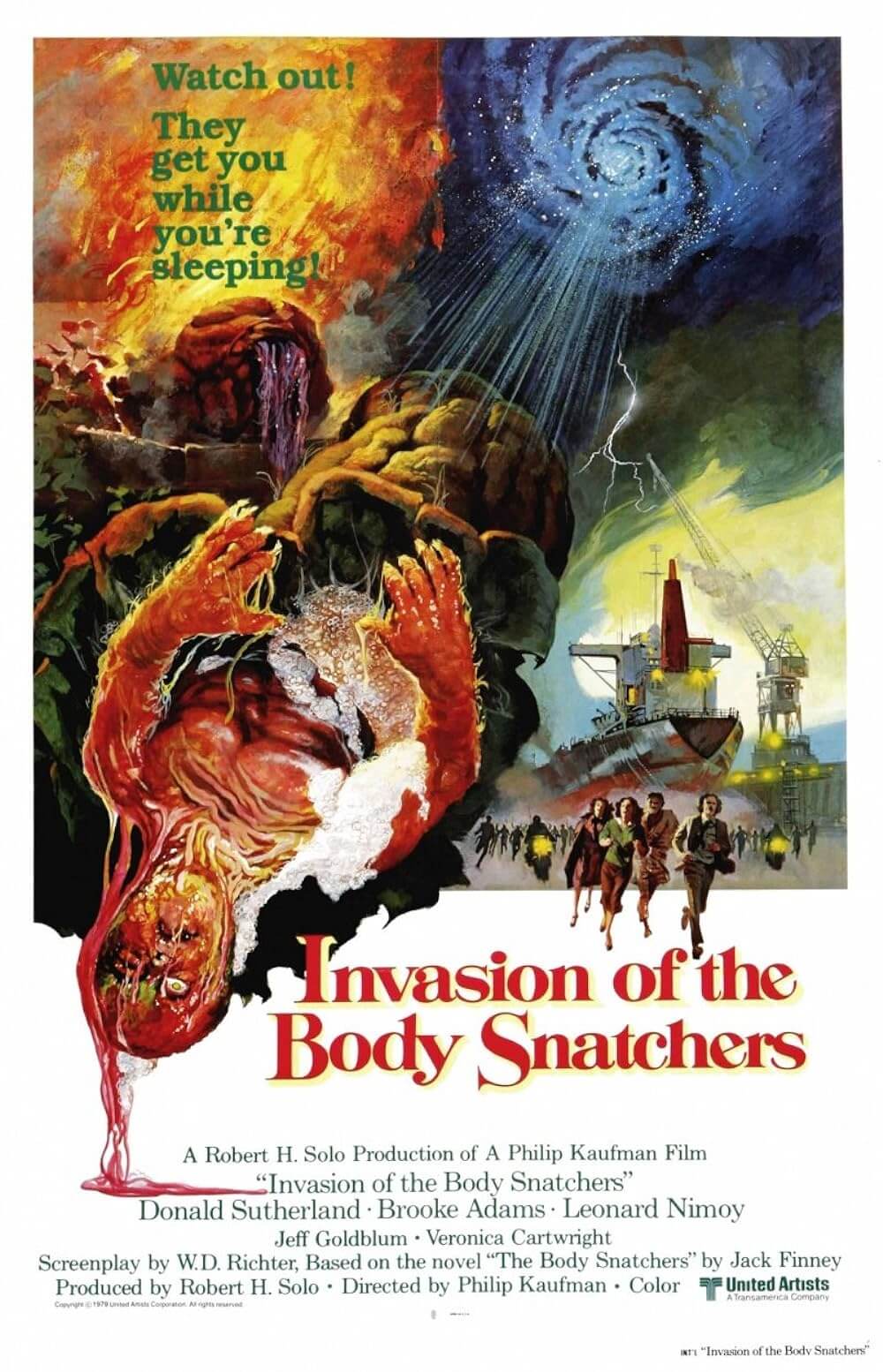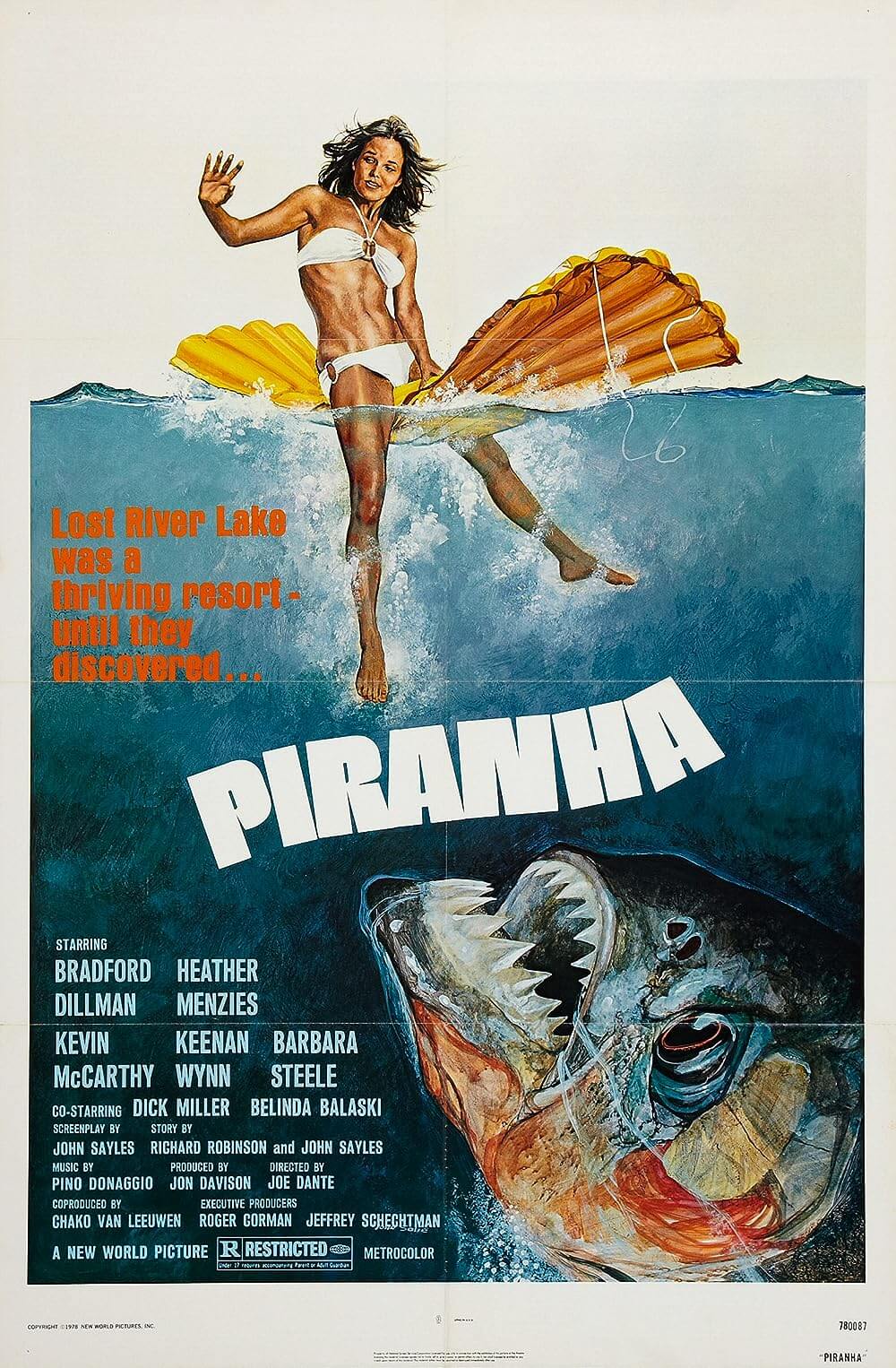Reader's Choice
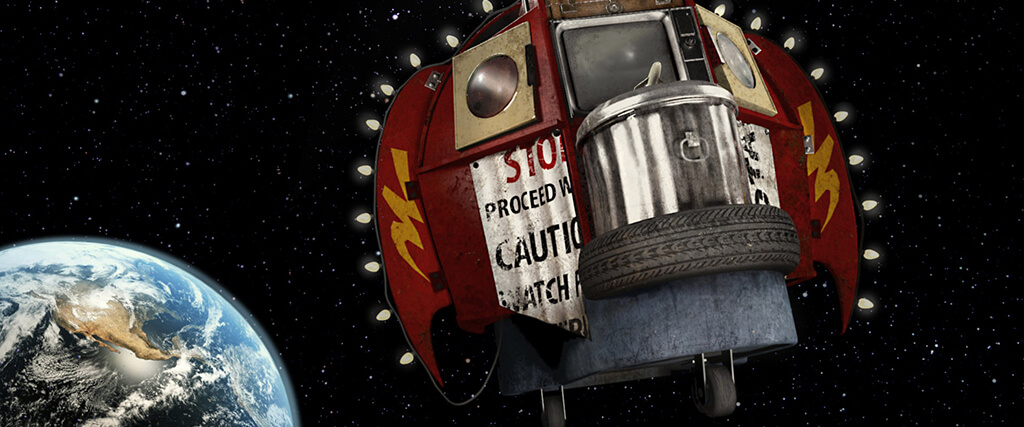
Explorers
By Brian Eggert |
Joe Dante’s Explorers might be an intricate, decidedly postmodern critique of how American pop-culture endlessly references itself, until we can no longer tell the difference between the real and the recycled. Or maybe it’s just a portrait of white suburban boyhood, another one of countless adolescent adventures made by Hollywood in the 1980s after Steven Spielberg’s sentimental fantasy E.T. The Extra-Terrestrial shattered box-office records in 1982. Dante’s movie, beloved by many of a certain age, features young boys and space aliens, familiar stuff for the period, and for today’s nostalgia-obsessed culture that continues to celebrate it. But even as Netflix’s Stranger Things mines Spielberg and Stephen King’s many tales of bullied youngsters confronting the other-worldly, Explorers remains a cult object—far from widely accepted as part of our nostalgia canon. The movie, released in 1985, is less interesting as entertainment than for its postmodern approach. It considers our recycled culture, where any source of truth has been copied and perverted so many times by pop entertainment that everything ceases to exist in its original form, only as copies. The movie addresses, if by accident, Jean Baudrillard’s theory, described in Simulacra and Simulation, that nothing is genuine anymore due to continuous cultural reproduction. It’s a theme embedded into Explorers‘ narrative as well as its representations of aliens, American pop culture, and homemade spacecraft.
The basic story of Explorers concerns three pre-teen boys who build a space module out of garbage: Ben (Ethan Hawke, in his first role) is a 1950s sci-fi fanatic who dreams of becoming an astronaut; Wolfgang (River Phoenix) is a science whiz; and their tough friend, Darren (Jason Presson), is a future mechanic with an alcoholic father. After interpreting an alien computer schematic implanted in Ben’s dreams, the friends build a working spaceship and, before long, it transports them to an alien craft in the stars. From the very start, the movie’s theme involves recycling forgotten objects to construct new meaning. They assemble their homemade craft out of parts from the junkyard (TV screens, trash cans, a washing machine door, and assembled computer parts, all contained inside a tilt-a-whirl pod), which flies within an airtight alien bubble. As a recycled craft, we no longer see the discarded junk or the alien bubble; we see only the spaceship that presents a new meaning. It’s an idea further encapsulated by their ship’s designation, Thunder Road, aptly named by the blue-collar Darren after Bruce Springsteen’s Born to Run song—which is about growing up and heading into the future no less.
After a pleasant hour building toward a journey into space, Dante introduces his aliens, and then Explorers comes to a screeching halt. Ben wonders if the aliens will be pure energy or thought waves, but he’s confident they will be “the greatest thing ever.” They are not. When a massive alien ship of industrial metal and steam pulls the Thunder Road into its dock, a security droid (in an image borrowing from Return of the Jedi) sniffs the boys before allowing them to meet two bulbous, chatterbox aliens. The aliens have learned about Earth from American television satellites and, believing our entertainment is who we are, they attempt communication by performing a series of taglines, catchphrases, and soundbites from icons, including Bugs Bunny, Mr. Ed, Groucho Marx, Tarzan, and Ed Sullivan. The zany, hyper-performed schtick seems to go on forever. Not even the boys find these antics much fun, evidenced by the unconvincing smile on the young Hawke’s face. Still, the sequence is not without its meaning. The aliens seek to replicate culture by copying it; though, instead of clear communication, their annoying behavior means nothing (“They don’t make any sense!” says one of the boys). Ultimately, the aliens challenge the Baudrillardian theory that, if you copy a thing enough times, the copy eventually becomes a simulacrum indistinguishable from the real thing—a theory disproved only because the aliens producing the copy have no sense of the culture, nor do they have the experience of cultural learning that would enable them to decipher the signs and signifiers of Western capitalist entertainment with any accuracy.
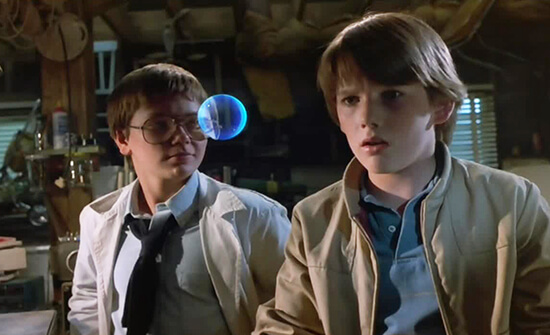
Just as the movie’s aliens attempt, and fail, to recycle our pop culture into a message with a cohesive meaning, the aliens themselves look like malformed creatures salvaged from a junk heap of bad extraterrestrial designs. Dante and his designers created them to appear as products of cultural overstimulation, and their appearance is appropriately cartoonish, grotesque, and stupid: Their green, naked, globoid bellies protrude outward. Their googly eyes sit at the end of wobbly shafts. Each has antennae, some designed after alien headbands, some resembling hands that stick outward. Suction cups cover their palms and the tips of their rubbery fingers. Their only clothing consists of some neck gear and loin covers, none of which conceals their bustle-like protuberance from their lower back, resembling a chubby caterpillar emerging from under the skin of their rear end. The entire design has been slathered in a slick, glistening jelly to complete the look. And their appearance is almost as irritating as the endless cartoon sound effects, among them bonks and whistles borrowed from Dante’s beloved Looney Tunes, and a dozen or more voices performed by Robert Picardo as Wak, the male alien. Meanwhile, Neek, the sister alien, doing a breathy Marilyn Monroe voice and looking suspiciously like the female gremlin from Dante’s Gremlins 2: The New Batch (1990), has a sexually loaded relationship with Wolfgang. And though one might apply Baudrillard to what’s happening onscreen, giving it some value, it doesn’t make sitting through this nonsense any more palatable.
Paramount Pictures recycled ideas and visuals from previous Hollywood hits to make Explorers as if following a blueprint for success. But in their rush to concoct a surefire blockbuster, the movie suffered. Screenwriter Eric Luke borrowed his scenario from other, better movies—Luke reverses E.T.’s trajectory, so young earthlings visit aliens this time. The studio reached out to Dante to direct, believing he could repeat the success of his Spielberg-produced Gremlins from 1984. Dante took imagery from the flying sequences in Superman (1978) and the computer world of TRON (1982), banking on the familiarity of it all. All the while, the studio was desperate for those summer moviegoing dollars and rushed Dante to complete the movie for an August release date. With a budget of around $25 million, filming started before Luke could deliver a finished draft of his script, while Industrial Light & Magic struggled to complete the special FX on time. Then Paramount underwent a change in leadership during the production. And usually, when a new executive in charge of production takes over, the previous regime’s projects become unwanted stepchildren—to the degree that the new executive may sabotage older productions as proof of the former regime’s failure. The studio halted Dante’s efforts in post-production; they resolved to cut spending and release an unpolished version of the movie into theaters, even though Dante and his editor had more work to do. That’s the movie that exists today. Either by intention or ignorance, Paramount moved up its release to July, just a few days after the landmark Back to the Future and on the same weekend as the monumental benefit concert Live Aid. Explorers not only received lukewarm reviews, but it also lost Paramount millions.
It’s not that critics and audiences were getting tired of the formula. Disney’s Flight of the Navigator tackled a similar idea the next year and made a hefty profit. Dante has since blamed Explorers’ failure on the hectic post-production schedule, calling the released version a “rough cut”—which would explain its plot holes and underdeveloped character arcs. But it doesn’t explain the glaring anticlimax. Consider the movie’s unsatisfying conclusion: Our heroes, who were compelled by alien-implanted dreams to visit the stars, have returned to Earth, disheartened because Wak and Neek were adolescents themselves, bound by the same parental restrictions as Earth children—even worse, aliens aren’t just ordinary, they’re aggravating. On the way back, Darren looks out the window of Thunder Road, and with an expression of profound melancholy, wonders aloud about what his drunken father is up to; after traveling to space and meeting an alien, his mind has returned to the banality of Earth. Indeed, the only growth these boys experience is realizing their mundane lives are a universal constant, shared by adolescents throughout the galaxy. Ben’s ambition to visit space and meet an alien has been spoiled by the discovery that aliens are no different than humans, and even more obnoxious. Darren, the D-student from the wrong side of the tracks, is doomed to become his father. Only the one-note Wolfgang has made some progress with another successful experiment. Given the boys’ underwhelming return to reality from the unappealing realm of space, they seem trapped, their dreams shattered. It might be a poignant conclusion if not for the exasperating, extraterrestrial source of the lesson.
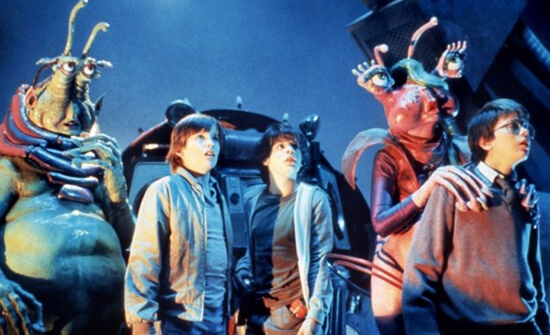
Commenting on the movie’s rushed release, Dante has remarked in interviews that some “spiritual kind of stuff” was omitted from his final cut. Though, evidence of this material still exists in the movie’s vague allusions to shared dreams. Several adolescents, even the kindly small-town police officer (played by Dante regular Dick Miller), experience the same vision of flying over their small town like Superman. Elsewhere, there’s a subplot about Ben’s stalkery obsession with a female classmate, Lori (Amanda Peterson), which develops into a romance—teaching a generation of young males that lingering outside of a girl’s window is not unwanted behavior. In any case, by the final scene, Lori joins the boys in their shared dream-flight through the clouds in a confounding sequence. It ends the movie on such a strange note, suggesting that our heroes will once again travel into space and endure more alien nonsense. But if spending more time with Wak and Neek sounds downright awful, maybe on their second journey into space Ben and company will find aliens who aren’t so loathsome. That’s about the best Explorers can offer: maybe something less annoying will happen next time. Alas, the movie is never better than the first hour’s portrait of how a particular class of pre-teen boys related to each other and played in the 1980s. Everything else, from the silly aliens to the underdeveloped dream flights, spoils the rambunctious pleasure of discovery and invention.
Explorers is a relatively straightforward movie for Joe Dante, until the aliens, with their pop-infused antics, arrive onscreen. It’s far from the ironic experiences of Gremlins and its sequel, though it contains a few of the director’s postmodern signatures. He inserts several clips from his beloved Atomic Era science-fiction, nostalgia from his own childhood, such as references to The Day the Earth Stood Still (1951), The Thing from Another World (1951), The War of the Worlds (1953), This Island Earth (1955), and Forbidden Planet (1956). Playfully, Dante lampoons many of these titles with his own film-within-the-film called Starkiller, and he even makes insider jokes about a “traveling matte”—the effect used by ILM to create the illusion of a flying spaceship. Today, watching the movie with a sense of nostalgia for the 1980s is compounded by Dante’s (and Ben’s) fondness for 1950s B-movies. Explorers could be seen as a simulacrum of those earlier classics, with the layers of nostalgia and reference perpetuating Baudrillard’s idea that our culture now values copies over their original source. How many viewers relate to the events in Explorers yet have no fondness for the 1950s titles listed above? In cases such as these, there is no need to have experienced the real thing before seeing its copy. Such is the nature of artistic influence flowing from older forms to newer forms, from pure creation to a multifaceted process of postmodern inspiration that continues to accumulate as each new generation attempts to recreate the films they loved as children.
Explorers contains the obligatory, classical science-fiction cautionary tale, derived from The Day the Earth Stood Still, about aliens looking down on Earth and seeing nothing more than a violent culture. When Wak and Neek watch our science-fiction movies, they worry that Earth might treat extraterrestrial visitors with hostility. But Ben argues, “This isn’t really real. We don’t kill people—well, we do, but not aliens because we haven’t met any.” The movie asks that we examine our own violence, as some of the greatest science-fiction movies do. At the same time, and to a more substantive postmodern effect, Explorers also suggests that the glut of American pop culture has seeped into space and made aliens just as intolerable as Earthlings. And if you’re unhappy here, you’ll be unhappy out there too. In fact, it’s even worse among aliens, who recycle our culture so poorly that their approximation remains not just unconvincing but regrettable and absurd. Even as Explorers considers these ideas with some impressive child actors, a good score by Jerry Goldsmith, and some Dante-brand humor, its finer points cannot overcome its unpolished production, the resounding disappointment of ridiculous aliens, and its disenchanting narrative journey. It’s a movie whose concept sounds better on paper than the experience of watching it, a prospect best reserved for cult nostalgists.
(Note: This review was suggested and commissioned on Patreon. Thank you for your continued support, Rolo!)
Bibliography:
Baskar, Nil and Gabe Klinger, editors. Joe Dante. Austrian Film Museum, 2013.
Baudrillard, Jean. “The Precession of Simulacra.” The Norton Anthology of Theory and Criticism. Ed. Vincent B. Leitch et al. W.W. Norton and Co., 2010, pp. 1553-1566.
Beard, Steve. Aftershocks: The End of Style Culture. Wallflower Press, 2002.
Collins, Jim. Uncommon Cultures: Popular Culture and Post-Modernism. Routledge, 1989.
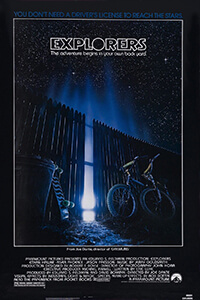
Thank You for Supporting Independent Film Criticism
If the work on DFR has added something meaningful to your love of movies, please consider supporting it.
Here are a few ways to show your support: make a one-time donation, join DFR’s Patreon for access to exclusive writing, or show your support in other ways.
Your contribution helps keep this site running independently. However you choose to support the site, please know that it’s appreciated.
Thank you for reading, and for making this work possible.
Brian Eggert | Critic, Founder
Deep Focus Review



